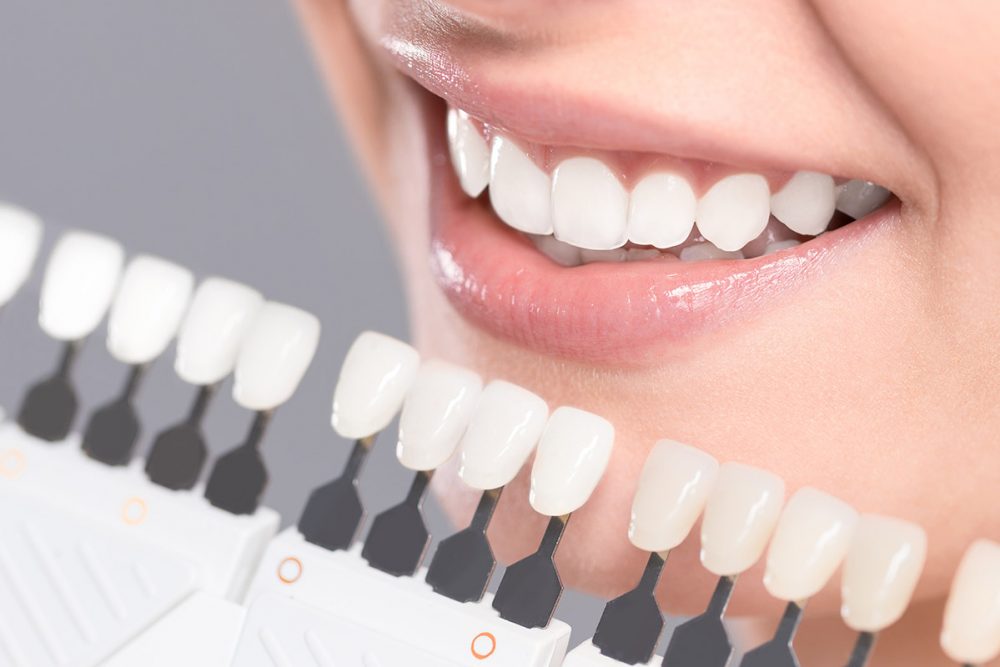
August 1, 2018
Teeth Whitening 101
We all want our smile to look its best, and even a relatively small change can have big results when it comes to your teeth. That’s one of the reasons tooth whitening is so popular! There are many options and products that promise whiter teeth, but it’s important to go about this process in a safe way that won’t leave you with damaged enamel or other permanent problems.
Staining and discolouration
There are several reasons teeth may be stained or discoloured. Some teeth are just naturally a less white shade, while others have become stained over time by habits like smoking, or drinking coffee, tea, or red wine. Drinking water while you enjoy these types of beverages can help to reduce the risk of staining your teeth. Smoking has many serious negative effects on your oral health and your overall wellness, along with the discolouration of your teeth. Read more about smoking and oral health here, and if you are ready to try quitting, we can help! Come in to talk to our dentists about setting yourself up for success.
The risks of whitening toothpastes
With the popularity of tooth whitening has come many, many products that promise you whiter teeth at home and at a low cost. However, whitening toothpastes can actually damage your teeth and gums over the long run, doing more harm than good.
Many abrasive whitening toothpastes do result in whiter teeth at first, because they removing stains with acid etching or with tiny abrasive particles that actually physically grind away stains. The problem is, they also wear away your tooth enamel, which does not regenerate. So while your teeth might look whiter at first, over time, as your enamel is polished away, your teeth may actually end up looking more yellowed as the supportive tissue under the enamel, called dentin, becomes visible. This undesired result comes on top of permanent damage to your tooth enamel.
If you use an abrasive whitening toothpaste only rarely to remove surface stains, your teeth will probably be alright. However, if you have veneers, you should never use an abrasive toothpaste, as this will damage the surface of the veneer.
If you want to use a whitening toothpaste, try a baking soda option such as Arm & Hammer. Baking soda (or sodium bicarbonate) is a very mild abrasive that won’t damage your enamel. Coming in to see us for regular professional cleanings will also keep your teeth whiter! After your cleaning, we use a powerful but safe polish that will get your teeth as white as they’ll ever be from brushing.
Safe whitening options
The good news is that is definitely possible to safely whiten your teeth – the key is to choose an in-office or dentist-supervised at-home option. There are two safe and effective ways we can help you get the brighter smile you’re looking for:
- In-office whitening
We offer the Philips Zoom WhiteSpeed system, which combines an in-office light-activated whitening treatment with an at-home follow-up regimen and touch-up kit. We can brighten your whole smile, or we can also improve just one or two discoloured teeth.
- At-home whitening
You can also opt for a simple and economical dentist-supervised at-home program, which should not be confused with over-the-counter bleaching products available at drug stores. This involves applications of about one hour per day for about a week.
Limitations, risk factors and longevity
While safe, dentist-supervised whitening programs can see great results, it is important to talk to your dentist about your unique situation and what you can expect.
Different types of staining respond better to certain treatments, so your dentist may recommend one method over the other based on your situation. Restorations such as bridges, crowns, or veneers will not whiten consistently with natural teeth, and sensitive teeth or teeth that are chipped, eroded, or weakened by cavities should be repaired or protected before whitening treatments are applied. Results of whitening can vary depending on other factors as well – for example, teeth stained by smoking or discoloured from fluorosis or from taking certain medications such as tetracycline during tooth development will be much harder to whiten.
Your dentist may recommend that you don’t go ahead with whitening if you have sensitive teeth, periodontal disease, teeth with worn enamel, or if you’re pregnant or breastfeeding. If you do get the greenlight from your dentist and decide to whiten your teeth, the brightening effects can normally be expected to last up to five years depending on your personal habits like smoking, or drinking coffee or tea.
Let us answer all of your questions!
If whitening seems like a good option for you, a consultation with your dentist is always the best place to start! Your dentist will answer your questions and provide you with the best information, for the best results.
Click here to book a consultation.